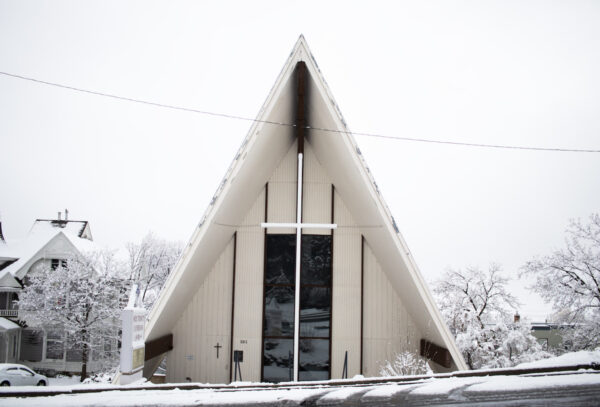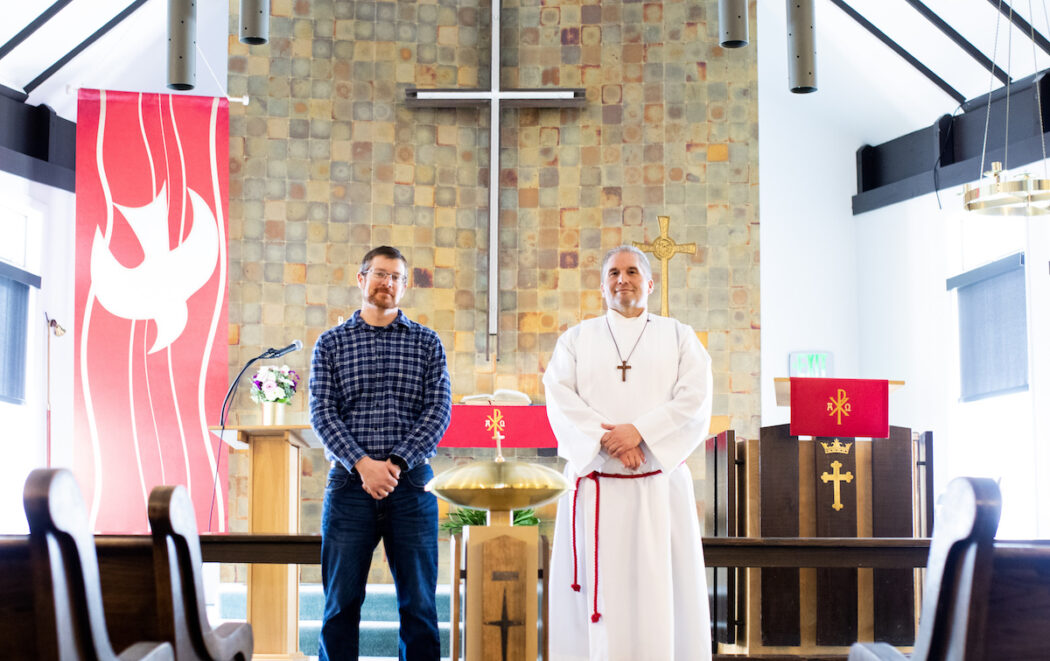Holy Trinity Lutheran Church binds together during pastor vacancy
The pastor’s study is on the bottom floor of Holy Trinity Lutheran Church in Logan. Though the lights are off during the Sunday service, the afternoon sun streams in from a large window, illuminating bookshelves, a desk and a few chairs.
In the early 1990s, these shelves were filled with the belongings of Pastor Gene Whitlatch. During that time, books and photos came and went until Whitlatch left for a congregation in Boise.
The shelves were empty for a year before Pastor Robert Weller moved in, and he wrote his sermons at that desk for the next six years before he cleaned out the study.
A year later, Pastor Scott Holder moved in. Eleven years later, he moved out. He’s moved congregations three times since then.
The most recent books on the shelves belonged to Pastor Josh Heimbuck. Though he cleared the office out when he left in 2021, some loose items still remain: a printer, various cords, some empty binders.
But the shelves have been empty since.
They were empty when I arrived at Holy Trinity for the first time in February. I’d gotten to the church earlier that morning wearing a new dress and scuffed boots. Standing in the snow, I waited for someone to walk through the door first, so I could follow them.
I’d forgotten my pen in the car, so I used the prayer roll pencil to jot down as much as I could about the building. The Christmas tree was still up, all the decorations were green, and around 30 people sat throughout the wooden pews during the service.
I had to pause my furious notetaking for the salutation, during which everyone in the congregation made their way around the room. They each shook my hand.
“Good morning.” “God’s peace.” “God’s peace.” “Good morning.”
One of the members read from the First Epistle to the Corinthians: “For when one says, ‘I follow Paul,’ and another, ‘I follow Apollos,’ are you not being merely human?”
Andrew Schuettpelz explained the verse further in his sermon. The apostle Paul, he said, was writing about divisions in the church at Corinth, where some early Christians had taken to listening to one leader and other believers to another.
“And we thought it was a problem having four elders leading worship service,” he said, receiving scattered laughs from the congregation.
Though he was giving the sermon, Schuettpelz is not the pastor of Holy Trinity. He’s a faithful, friendly spacecraft engineer. Mark Brunson is a guitar-playing, sweater-wearing professor of environment and society, who charts out Sunday worship service each week and leads the hymns every other week. Jeremy Edwards works for a power company and gave his first sermon last month. Joseph Pierson is a deputy sheriff currently assigned as a bailiff, planning to retire and study for the ministry, which is probably why he described the role of the pastor as being like the judge in a courtroom.
These four are the elders who have been filling in while the pastor’s study remains empty.
At the time of my first visit, it had been 15 months since Pastor Heimbuck had left. The church at the base of Old Main Hill has gone without a leader since.

Holy Trinity Lutheran is located at 581 N 700 E in Logan, right across the street from Old Main Hill. (Photo/Bailey Rigby)
“Every time we have a vacancy, getting a new one is difficult, given our location and demographics,” Pierson said.
Logan is 40 minutes from the interstate and 85 minutes from an airport. A 2014 study reported that less than 1% of adults in Utah are Lutheran. The congregation at Holy Trinity is small, and more members are over 50 than under.
Being old, small, and in the middle of nowhere makes it more difficult for Holy Trinity to get a new pastor, and a shortage of pastors only makes it harder.
“In some sense we’re playing musical chairs with pastors because there’s only so many out there,” said Kathy Bayn, a friendly, chatty woman who has been attending Holy Trinity for half a century. “We’re vacant, we don’t want to be vacant, so we’re going to call somebody. Well, that’s going to cause a vacancy somewhere else.”
The days of pastors staying in one place, marrying and burying everyone in a community, are over. These vacancies are common, so the elders are well-equipped to fill in.
Since Pastor Heimbuck left, the four elders have led Sunday worship and kept track of the congregation. They also make up the committee responsible for extending a call to a new pastor.
They make these decisions from a computer screen, four squares on a Zoom call. Brunson described it as a meeting between old friends who are facing a new challenge.
The first question they needed to answer was whether they would extend a call to a pastor in the field or one right out of seminary. A small number of students leaving the seminary makes that path more difficult to begin with, but the elders also agreed that someone who is more seasoned might be more comfortable with their older congregation.
That’s what the elders thought they may have found when a pastor from California reached out to ask if they would consider him for the job.
The elders also had to consider a list of other candidates from the Lutheran Church-Missouri Synod Rocky Mountain district. But when that list was narrowed down to a handful of pastors who were presented to the congregation and voted on (in a meeting that Brunson said wasn’t “heated” so much as “spirited”) the pastor who had reached out was the top choice.
So, they extended the call.
“We thought it was a slam dunk,” Edwards said.
But the pastor declined.
Schuettpelz was surprised but didn’t allow himself any other reaction. “It’s a call from God, but there is the human aspect of it, too. They have to pick up their families. Maybe they’re living near an elderly parent, and at the moment they’re feeling called by God to stay there,” he said. “So it’s a tough balancing act between God’s plan — which we never fully know — and our little human plans.”
And so the process started over.
But the committee couldn’t just go with option B. God was pointing them in the direction of that first pastor.
“We need to put that trust back in God’s hands and get a new list of names, and hopefully he leads us to one that will say yes,” Edwards said.
This is also a strategy to avoid conflict since both the pastor and the congregation would know they were the second option.
“You don’t want to create a situation where you have these underlying responses that are driven out of sin,” Schuettpelz said. “They’re not driven out of love and God’s plan for us. So the whole goal is to remove those barriers to create the best possible scenario for a pastor and congregation.”
Pierson will start his seminary classes online this fall, and he hopes to one day be the pastor at Holy Trinity, “however it plays out.” His aspiration is to take over when he is done if there still isn’t a pastor by then — or whenever the next vacancy is. But the program takes four years.
From leading Sunday service to starting seminary classes to going through the call process again, there’s a lot on the elders’ plates. But there’s some things the pastor was responsible for that the elders are not ordained to do, and so anyone with pastoral needs has to be connected with a pastor from another congregation.
Most of the time, it’s younger people who need a pastor, whether for a wedding, baptism or confirmation. Since the demographic at Holy Trinity is older, it hasn’t really been an issue so far.
But for Schuettpelz and his wife, who are expecting a baby in June, it will be. Lutherans practice infant baptism, so if there isn’t a pastor at Holy Trinity by then, they will have to find one to baptize their baby.
“It’s something that’s sitting around in the back of my head floating there,” Schuettpelz said. “Are we going to have a pastor by then? How will my wife and I handle that?”
Edwards also had to make special arrangements for his son, who is in middle school and ready to go through a two-year confirmation class. Normally, he would meet with the pastor weekly and complete other special projects. Instead, he will attend the class over Zoom with another congregation’s pastor this fall.
The biggest loss is Holy Communion, which the elders are not ordained to perform. Pastor Heimbuck performed it every week but, since he left, a retired pastor visits the congregation once a month to administer the Lord’s Supper.
Though it’s common for attendance to dwindle during a vacancy, that hasn’t been the case for Holy Trinity, small as the congregation is.
In towns that aren’t in the middle of nowhere, or filled with members of the Church of Jesus Christ of Latter-day Saints, as Logan is, people can move to a different congregation that actually has a pastor. Other than Holy Trinity, the closest Lutheran church for people in Cache Valley is 45 minutes away, in Ogden. So, their only option was to come together.
Giving has been consistent, too. Piles of grocery bags and egg cartons to be donated to the Cache Community Food Pantry cover a table in the basement. Empty baby bottles wait near the entrance to be filled with money for the Center for Pregnancy Choices.

Members of Holy Trinity collect items each week to be donated to Cache Community Food Pantry in Logan. (Photo/Bailey Rigby)
“Some people have stepped up and done even more than when there wasn’t a pastor, the elders especially. They’ve had a lot put on them,” Bayn said. “But others are trying to help them maybe more than they would when the pastor is there, and that’s kind of a good thing to do every once in a while to light a fire.”
Other things have fallen through the cracks. A handful of us stood outside the church building on a recent week because no one told us services had been canceled for weather. Members don’t have a pastor to share confidential conversations with. It can also be hard to keep track of people in need, especially those who don’t attend regularly.
“But,” Bayn said, “we’re not falling apart.”
Actually, Pierson said, the congregation comes closer together during times like these.
“During a vacancy, I think we bind together, and you see a lot of people stepping up out of their comfort zones and doing stuff they normally wouldn’t,” he said.
When Pastor Heimbuck left, Schuettpelz said, “there wasn’t really a sense of, ‘Oh, no the world was going to end, what are we to do?’ It was ‘OK, folks, we all have strengths and weaknesses. We have our roles in the church. Let’s just fulfill them to our best.’”
And the world hasn’t ended. By the second Sunday of March, the Christmas tree was down, and I learned it had been kept up on purpose to recognize the season of Epiphany. Before services began, someone announced that more than $1,000 had been raised by the congregation for a snowblower for a Lutheran outdoors camp. There were still around 30 people sitting in the pews that day.
A retired pastor, David Fischer from Salt Lake City, led worship service. I struggled through unfamiliar hymns, which were accompanied by an organist instead of Brunson’s guitar.
When ushers came through the congregation inviting people to receive Communion, members walked forward and kneeled in a row while the congregation continued to sing. Each received either Communion or a blessing from the pastor. Then, they were dismissed, and another row took their place. Once everyone had their turn, we stood and thanked God.
After a final hymn, Pastor Fischer told us to go in peace as we serve the Lord. We filed downstairs for a potluck lunch, and members chatted amongst themselves while finishing touches were put on the food.
The door to the empty pastor’s study was wide open the whole time.
— darcy.ritchie@usu.edu
Editor’s note: This story was updated on April 14 with more information about why Holy Trinity’s Christmas tree remained up after Christmas.

